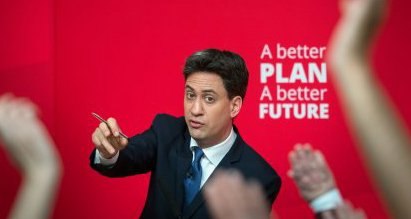As the end of the campaign draws near a deadlock looks, if anything, even more likely than it seemed at the beginning.
That’s because the party leaders have been hardening their positions. If there is a hung parliament it seems it will be even more difficult for either Mr Cameron or Mr Miliband to negotiate an agreement But eventually that deadlock is going to have to be broken one way or another - even if no one can yet see an obvious way to do it. How do you think a government should be put together after 7 May?
It’s possible, of course, that we may all be in for a big surprise. With so many voters apparently not yet having made up their minds there could be a late surge to one or other of the two main parties, so producing a majority government. But don’t hold your breath. The chances of it happening are estimated by some experts to be less than one in a hundred.
What does seem to have changed over the last week or so is that the likelihood of a stable coalition being formed is receding. With the polls as they are, the Liberal Democrats would not have enough MPs to help either the Conservatives or Labour secure the combined total of 323 seats necessary to vote through a coalition government’s Queen’s Speech opposed by all the other parties. So it would need the backing of others to get it through. Yet the main parties have been blocking off the chances of this happening.
The main player here is the Scottish National Party, now thought certain to emerge as the third biggest party in the next House of Commons with forty or more seats. There is even speculation the SNP might sweep the board and win all fifty-nine Scottish constituencies.
Both the Tories and the SNP itself have ruled out any deal between themselves. Until Thursday evening Labour had ruled out only forming a coalition government with the SNP. That left open the possibility of a deal in which the SNP agreed to support a minority Labour government on vital issues. But in his Question Time appearance on Thursday night Ed Miliband ruled this out too. He said: ‘I am not going to have a Labour government if it means deals or coalitions with the SNP.’
Nicola Sturgeon, the SNP leader, expressed outrage. She said the Scottish people would never forgive Labour if, rather than coming to an agreement with the SNP that would allow a minority Labour government to be formed, Mr Miliband preferred to let the Tories stay in power. But he insists he could not do any deals with a party that wants to break up the United Kingdom. So deadlock seems the most likely outcome.
But there has to be a government, so what should happen?
Our constitution, because it is unwritten, is open to different interpretations about what should happen in situations of electoral deadlock. But some things are clear enough. A government that cannot command the support of the House of Commons on ‘confidence’ issues, such as a Queen’s Speech, cannot legitimately stay in office and nor can it be required to do so. Mr Cameron, therefore, would need to resign if his government had been defeated on such an issue or if it were obvious that it certainly would be. The Queen would then have to ask Mr Miliband to have a go. But the whole point about the deadlock we seem likely to encounter is that he could then find himself in exactly the same position. With no other major party leader to turn to, the Queen would appear to have run out of options .
The obvious solution would be to hand the problem back to the British people and get them to sort it out in another election. That is not as easy as it used to be because of the Fixed Term Parliament Act, which was introduced in 2010 to deprive prime ministers of their previous power of calling an election before five years were up. Most observers, though, think there are perfectly legal ways to override this, especially if politicians themselves agreed that the stalemate required another election.
That second election, however, might well produce much the same outcome. So what then? To call a third election would seem absurd. As Einstein pointed out, it is a mark of insanity to keep repeating an experiment in the hope that sooner or later it will produce a different result.
Two options would then seem to suggest themselves. One would be for opposition parties to impose upon themselves a self-denying ordinance by abstaining from defeating a minority government on major issues in the hope that such a government would prove itself so weak and unpopular that the opposition would be swept to power in the ensuing election. But that’s not how politicians tend to behave, especially as they might have to wait five years before gaining their reward.
The other option is for the two main parties to reach the judgement that since the electorate won’t resolve the problem, they will have to do it themselves by forming a grand coalition. This might even be contemplated before subjecting voters to a second election.
Of course this is not something the Conservative and Labour parties are even whispering about at the moment. And there are huge difficulties that would need to be overcome to bring it about, not least the animosity parties tend to feel towards the leadership of the opposing parties. There might have to be a big clear-out of the Camerons, the Milibands and the Cleggs before this could happen. But it would break the deadlock.
So the choice after an indecisive election on May 7 may boil down to this: calling another election in the hope of getting a different result, or making the Tories and Labour realise that only a coalition between them will break the deadlock. If that turns out to be the choice, what would you want them to do?










